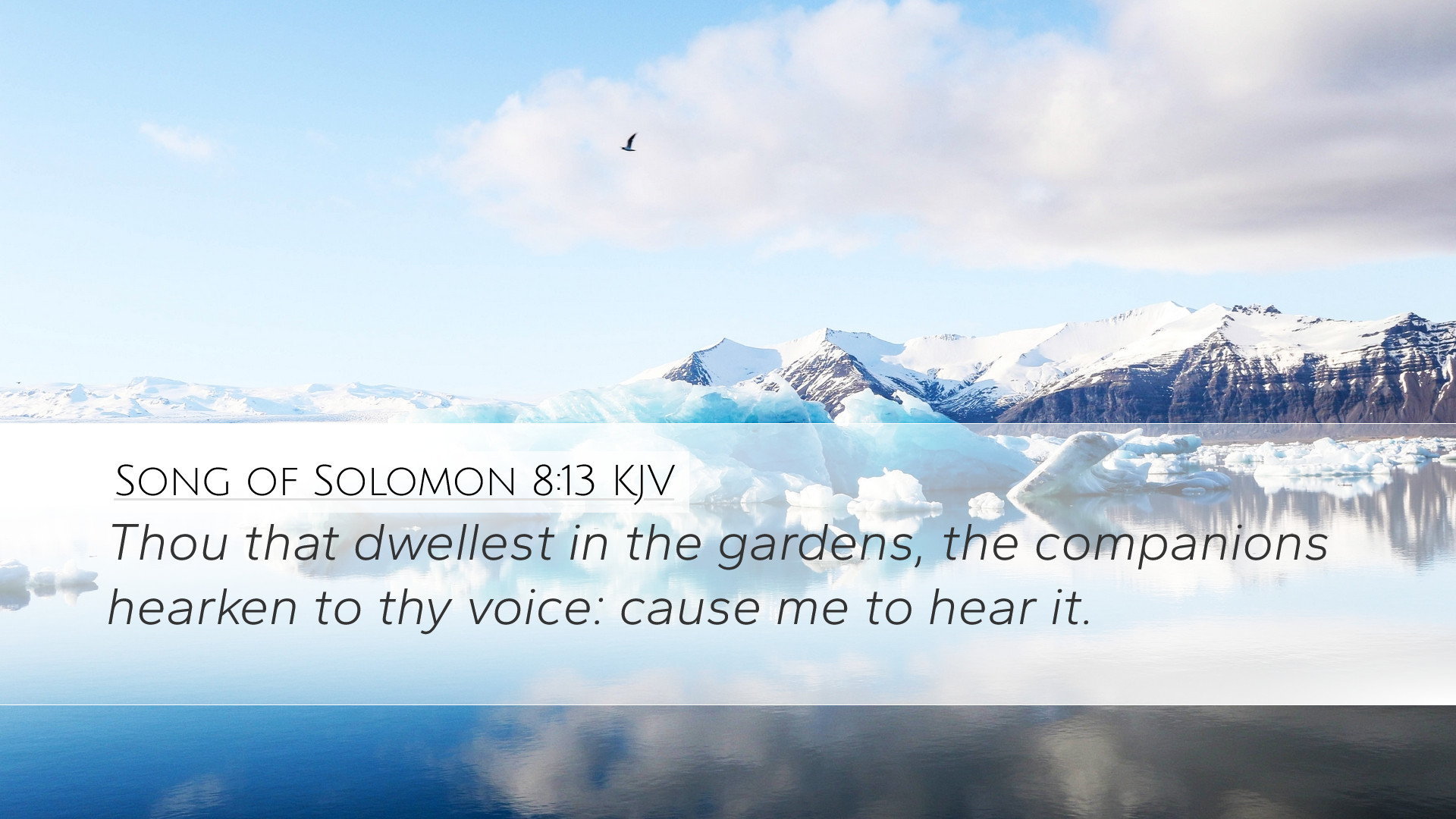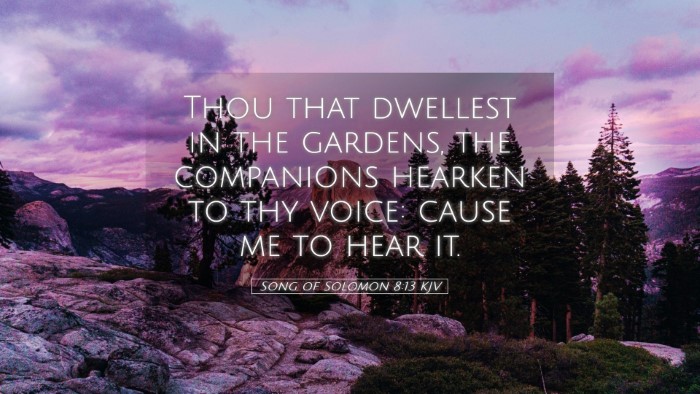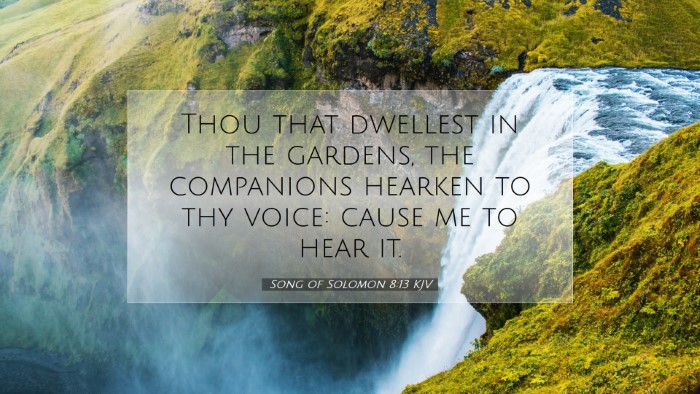Old Testament
Genesis Exodus Leviticus Numbers Deuteronomy Joshua Judges Ruth 1 Samuel 2 Samuel 1 Kings 2 Kings 1 Chronicles 2 Chronicles Ezra Nehemiah Esther Job Psalms Proverbs Ecclesiastes Song of Solomon Isaiah Jeremiah Lamentations Ezekiel Daniel Hosea Joel Amos Obadiah Jonah Micah Nahum Habakkuk Zephaniah Haggai Zechariah MalachiSong of Solomon 8:13
Song of Solomon 8:13 KJV
Thou that dwellest in the gardens, the companions hearken to thy voice: cause me to hear it.
Song of Solomon 8:13 Bible Commentary
Commentary on Song of Solomon 8:13
Song of Solomon 8:13 states: "Thou that dwellest in the gardens, the companions hearken to thy voice: cause me to hear it." This verse captures the intimate relationship between the beloved and the lover, emphasizing themes of love, longing, and communication. The insights from various public domain commentaries provide a profound understanding of this passage.
Introduction
The Song of Solomon, attributed to Solomon, is a unique book of the Bible that celebrates love and desire. Within its poetic structure, it presents the profound emotional and physical connection between lovers, imbuing the text with layers of meaning for both personal reflection and theological insight. Song of Solomon 8:13 serves as a pivotal moment that encapsulates the essence of yearning and relationship dynamics.
Exegesis of the Verse
This verse addresses the beloved directly, acknowledging her presence in the lush gardens, a symbol of beauty and intimacy. The phrase "Thou that dwellest in the gardens" suggests a place of safety and pleasure, reinforcing the idea that this is a sacred and exclusive space for lovers.
Matthew Henry's Insights
Matthew Henry emphasizes the closeness of the relationship expressed in this verse. He interprets the gardens as not just physical spaces but spiritual realms where love flourishes. The beloved, dwelling in the gardens, represents purity and beauty, notably separated from the worldly distractions. Henry notes that her voice is a source of joy and that the companions (friends or other onlookers) are attentive to the beloved’s call. He highlights that this reflects the communal aspect of love, where those around the couple are drawn into the richness of their relationship.
Albert Barnes' Perspective
Albert Barnes offers a somewhat devotional interpretation, stating that the lover’s plea to hear the beloved's voice signifies a deep longing for communion. Barnes reflects on the companions who "hearken to thy voice" as a metaphor for those who recognize the importance of this relationship, suggesting that the voice of the beloved is one of authority and allure that compels attention. He also connects this to the broader themes of the Song, where the voice signifies guidance, comfort, and the assurance of love.
Adam Clarke's Analysis
Adam Clarke provides a scholarly perspective, indicating that the gardens symbolize both the physical and spiritual aspects of a relationship. He notes that the beloved's voice has a dual role—a source of personal experience and communal reflection. Clarke suggests that the beloved's call is not merely an individual longing but is one that resonates with others who witness their love, illustrating how love can inspire and affect a larger community.
Theological Implications
The verse invites deeper contemplation on the nature of love, emphasizing that love is not only personal but also communal. It demonstrates the beauty and holiness of intimate relationships, tying them to the concept of divine love. Reflecting on the role of the voice hints at the significance of communication within relationships—both with the divine and among partners. The plea to hear this voice can also be seen as a metaphor for the human longing to hear and respond to God.
Applications for Pastors and Theologians
This verse, rich in imagery and meaning, can serve as a powerful illustration for sermons on love, relationships, and the nature of God’s love for humanity. Pastors might focus on the beauty of communication in relationships and encourage congregants to cultivate such intimate communication with each other and with God.
Moreover, the concept of the garden as a sacred space invites theologians to reflect on what it means to create environments where love can thrive spiritually and relationally. The idea that companions are drawn to the voice of the beloved can inspire discussions on how the love manifested in our lives can attract others to Christ.
Conclusion
In conclusion, Song of Solomon 8:13 encapsulates the depth of yearning for love and connection, reminding readers of the importance of communication and intimacy in relationships. Insights from Matthew Henry, Albert Barnes, and Adam Clarke provide a well-rounded understanding of this text, enriching the reader's appreciation of its theological and relational significance. As a timeless reflection on human relationships, it invites all—pastors, students, theologians, and scholars—to further explore the complexities of love as portrayed in Scripture.


